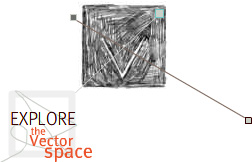ThoughtMesh
Tag your writing. Join the conversation.
Designer's Statement: Taking the Web with You
Web developers, I think, sometimes feel that the world is going to disappear. Maybe not the actual world, but working in a landscape of software code, servers, and Internet connections that come and go, we see online projects, documents, and other various forms of information go up and come down, never to be seen again. The temporal nature of the Web is due to the placement of all material on an abstracted machine in another part of the country. And, unless certain technologically intensive steps are taken, a user would find it very difficult to "take a Web site with you" once disconnected from the Internet.
The inability to get hold of a Web project stems in part from the necessary security restrictions involved with such a public arena as the Web, and also specialized, exceptionally efficient portable databases (such as MySQL). Unlike Microsoft Excel—or Eudora email, another type of database—MySQL lives on the server and is only accessible via the actions of the developer. Excel provides a powerful desktop application to interact with data, while MySQL lives on a server, only to reach the user through the Web project being viewed.
Certainly, Web developers aren't the only ones feeling timid about the current state of the Web. Placing content online seems necessarily to involve losing your rights to the display, peripheral and linking information, even editorial control. And, if the server is taken offline, the record is completely lost.
Finding the online document can also be problematic. The sheer power of online search engines can also be a downfall; search results in many popular subjects are already fully formed. Ranking on the first few pages of a search result can be next to impossible for a researcher's material. There are other options including online "warehouses" of scholarly material, yet with seemingly everyone talking about the "semantic Web"—the world linked by emergent rather than literal connections—the search bars on popular scholarly sites fall short of delivering a way to search out content based on theme, mood, feeling, or other non-literal means.
However, there of course needs to be documents and projects online. The levels of exposure are limitless, and the new connections formed are critical to scholarship. ThoughtMesh takes advantage of the Internet by mapping semantic tags to link documents to each other, a feature that is preserved when a Mesh is downloaded to your computer or own server. ThoughtMesh provides the opportunity to find other documents through semantic links, not literal string matches. Furthermore, the tag-based linking does not block my control of the document: I can re-publish and re-tag the document online, or, downloading the document, I may still access other documents if on a live Internet connection.
Jon Ippolito's work researching new access paradigms is raising questions about the current state of relational information on the Internet, and ThoughtMesh is a practice-based avenue to explore answers. Downloading the ThoughtMesh files to my laptop, disconnecting the Internet connection, and moments later displaying the Meshed document to colleagues is intriguing. Through ThoughtMesh's many points of access ranging from placing documents online, semantic tagging, download features, and (soon) the ability to create one's own Mesh network, this project begins to alleviate the temporary feeling I have been living with for some time.
August 2007



